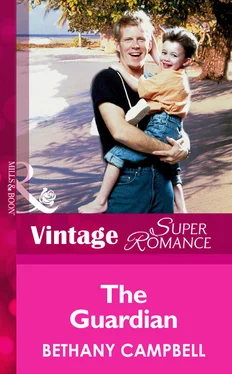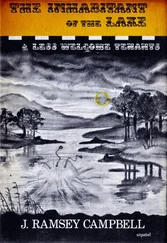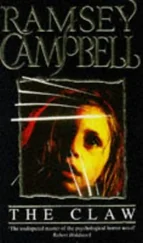Hawkshaw went over the Kanaday woman’s file again. Hawkshaw went over the Kanaday woman’s file again. Now that he’d met her and the kid, the case no longer seemed an abstraction, nor did they. They were flesh and blood. And the reality of her was distracting, too distracting. Because she wasn’t the woman he wanted. He forced himself to look at the fuzzy reproductions of the snapshots that Corbett had sent of Kate. There were only three. The first showed her and the kid sitting before a towering Christmas tree. The kid, Charlie, was mugging for the camera, and she was smiling with what seemed like real joy. Her smile was nice, full of life. He wondered if she would ever smile that way again. He set the photos aside and took a sip of beer. A lone light shone from the farthest window of the house. Kate had left the bathroom light on for the kid, a gesture that touched him in spite of himself. Don’t be touched, he warned himself. Don’t feel anything. The woman and kid had come into his life suddenly, and with luck they’d disappear just as suddenly. Until then, he’d watch out for them because they were a legacy from Corbett, a favor to be returned and a debt to be paid. But nothing personal. He would stay uninvolved. He had made it his specialty.
Letter to Reader Dear Reader, My husband and I visit Florida’s Lower Keys as often as possible and have explored the backcountry by kayak. I love the loneliness and wildness of the place—although I could have done without getting to know a certain sea slug quite so well. Before writing this story, I read a lot about the backcountry, stalkers and attention deficiency in children. There’s a lot of my son in Charlie—a bright, imaginative kid intensely frustrated by reading problems and handicapped by an overabundance of energy and a tendency to march to a different drummer. He overcame his difficulties much as Charlie does. Today he teaches composition and Shakespeare at the University of New Orleans. Writing this book made me aware again of the challenges such children—and their parents—face. The best part was the reaffirmation that such challenges can be met. Sadly, writing The Guardian also made me painfully conscious of the inadequacy of stalking laws in the United States. I hope we can work to better them. Sincerely, Bethany Campbell
Title Page The Guardian Bethany Campbell www.millsandboon.co.uk
Dedication To Margot Dalton— Who, like E. B. White’s Charlotte, is not only a good friend, but a good writer.
CHAPTER ONE CHAPTER TWO CHAPTER THREE CHAPTER FOUR CHAPTER FIVE CHAPTER SIX CHAPTER SEVEN CHAPTER EIGHT CHAPTER NINE CHAPTER TEN CHAPTER ELEVEN CHAPTER TWELVE CHAPTER THIRTEEN CHAPTER FOURTEEN CHAPTER FIFTEEN CHAPTER SIXTEEN CHAPTER SEVENTEEN CHAPTER EIGHTEEN CHAPTER NINETEEN Copyright
Hawkshaw went over the Kanaday woman’s file again.
Now that he’d met her and the kid, the case no longer seemed an abstraction, nor did they. They were flesh and blood.
And the reality of her was distracting, too distracting. Because she wasn’t the woman he wanted. He forced himself to look at the fuzzy reproductions of the snapshots that Corbett had sent of Kate. There were only three.
The first showed her and the kid sitting before a towering Christmas tree. The kid, Charlie, was mugging for the camera, and she was smiling with what seemed like real joy. Her smile was nice, full of life. He wondered if she would ever smile that way again. He set the photos aside and took a sip of beer.
A lone light shone from the farthest window of the house. Kate had left the bathroom light on for the kid, a gesture that touched him in spite of himself.
Don’t be touched, he warned himself. Don’t feel anything.
The woman and kid had come into his life suddenly, and with luck they’d disappear just as suddenly. Until then, he’d watch out for them because they were a legacy from Corbett, a favor to be returned and a debt to be paid.
But nothing personal. He would stay uninvolved. He had made it his specialty.
Dear Reader,
My husband and I visit Florida’s Lower Keys as often as possible and have explored the backcountry by kayak. I love the loneliness and wildness of the place—although I could have done without getting to know a certain sea slug quite so well.
Before writing this story, I read a lot about the backcountry, stalkers and attention deficiency in children. There’s a lot of my son in Charlie—a bright, imaginative kid intensely frustrated by reading problems and handicapped by an overabundance of energy and a tendency to march to a different drummer. He overcame his difficulties much as Charlie does. Today he teaches composition and Shakespeare at the University of New Orleans. Writing this book made me aware again of the challenges such children—and their parents—face. The best part was the reaffirmation that such challenges can be met.
Sadly, writing The Guardian also made me painfully conscious of the inadequacy of stalking laws in the United States. I hope we can work to better them.
Sincerely,
Bethany Campbell
The Guardian
Bethany Campbell

www.millsandboon.co.uk
To Margot Dalton—
Who, like E. B. White’s Charlotte, is not only a good friend, but a good writer.
CHAPTER ONE
THE SHARK WAS DUSTY.
Nearly six feet long, it was stuffed, mounted and hung on the wall above the sagging couch. Its downturned mouth grinned with cruel teeth.
On the shark’s head was a black baseball cap. In white letters, it said UNITED STATES SECRET SERVICE.
A tall man, naked except for a towel knotted around his middle, stood before the shark. He held the phone and listened to a voice half a continent away. His face was grim.
I don’t want to get involved, he thought with deep distaste. Those days are over. I’m out of the game. For good.
But because it was Corbett talking on the other end of the line, Hawkshaw listened.
“There’s no choice,” Corbett said. “She’s got to get out of town. She knows it. I can’t keep her safe.”
Hawkshaw adjusted the towel around his waist. He was dripping salt water onto the old braided rug.
He said, “I was about to get into the shower.”
Corbett said, “This guy who’s after her—this stalker—he’s getting dangerous. Not just to her, to her kid. He’s started to look on the kid as some sort of rival.”
A kid, Hawkshaw thought with weariness and guilt. He tried to keep himself indifferent, unassailable. “Why can’t the police handle it?” he asked.
Corbett said, “The guy’s smart, Hawkshaw. He doesn’t threaten her outright. But he never stops watching her. And he lets her know he’s watching—and that he wants her.”
Hawkshaw sighed in disgust. He didn’t like the sound of this. An anonymous stalker was the worst and most slippery kind. “You’ve got no idea who this psycho is?”
“None. He’s a voice on a phone. He’s a note in the mail. He’s the ice pick in your tire. The dead bird on your doorstep.”
“How long has he been after her?”
“Eighteen months,” Corbett said. “It started with a couple of notes. Anonymous calls. It built. She changed her number, kept it unlisted. I encrypted her computer so nobody could get into her e-mail. But nothing works. She needs to get the hell out of here.”
Hawkshaw stared at the shark. It returned his gaze with a glassy, emotionless eye.
“What’s the matter?” he asked. “Hasn’t she got people of her own to go to?”
“No. Her parents are dead. She’s a widow. She’s got a friend in another city who’ll help. But I don’t want her going straight there. I want to throw this bastard a curve. Have her take such a crooked path, he can’t follow.”
Читать дальше













